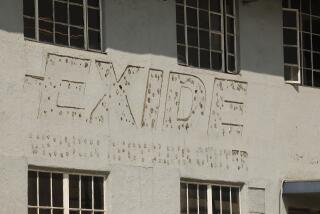Citizens Panel to Study Toxic-Waste Project
WHITTIER â The City Council has appointed a citizens committee that will play a major role in deciding whether to allow an expansion by a hazardous-waste disposal company that botched the cityâs toxic-waste roundup last summer.
Review by the committee is a new requirement under the Tanner Act, a state law regulating the handling of hazardous wastes. The law calls for the appointment of a seven-member Local Assessment Committee each time a hazardous-waste project is proposed.
âPressing Needâ
City Manager Thomas G. Mauk said there was âa pressing needâ to form such a committee this month to review Omega Recovery Serviceâs application for expansion, which will reach the city sometime next month.
Omegaâs principal business is recycling about 2 million pounds of air-conditioning coolants each year, although the company also recycles some paint wastes and other chemicals, said President Dennis OâMeara.
The expansion plans call for Omega to double its one-acre facility near the intersection of Whittier and Washington boulevards. The expansion would add a storage area to the plant, which OâMeara said is the nationâs only recycling facility for air-conditioning wastes. Because the state classifies such businesses under the general category of waste disposal, the rarity of air-conditioning recycling plants could not be confirmed by state officials.
âThe state needs this facility,â OâMeara said, particularly in light of legislation being studied by state lawmakers that would require more waste to be recycled.
Terms to Be Negotiated
The terms of Omegaâs proposed expansion will be negotiated with the local committee, said Jim Marxen, a spokesman for the toxics division of the state Department of Health Services. If there is disagreement, the state can appoint a mediator, he said. The City Council would consider the project only if a special operating permit is required.
This week, the council appointed these Whittier residents as committee members:
William Krenz, a retiree who has worked in the engineering field; James McKenna, an environmental engineer; Richard Plute, who works in hazardous waste transportation; Joe Holiday, a petroleum development geologist; Bill Lenihan, a commercial and industrial real estate sales and leasing agent; Kendrick Eilar, a chemical engineering environmental consultant, and William McCracken, a chemist.
Marxen added that Omegaâs handling of Whittierâs toxic-waste roundup will not affect the stateâs consideration of the expansion. In June, Whittier paid Omega $60,000 to supervise its first roundup, in which residents dropped off chemicals such as weed killer and old paint at the maintenance yard on Painter Avenue for legal disposal. During the roundup, OâMeara created a small toxic cloud by mixing several types of potent acid in a 55-gallon drum.
The Los Angeles County Fire Department temporarily sealed off the area until the cloud dissipated. OâMeara, who was not wearing the proper protective clothing, was treated at a hospital for burns on his face and arms.
Mishap Not Related
City Manager Mauk said the mishap will not affect Omegaâs expansion plans. The committee will undertake a âscientific analysis of material (Omega) handles and equipment they use,â Mauk said. âI think the fact that the guy is out pouring paint in a drum when heâs not supposed to signifies one thing. His processing plant is far more important.â
The state Department of Health Services cited Whittier for failing to report the accident within 60 days and threatened to fine the city $30,000. Whittier officials maintained Omega was responsible for the mishap, though the city fired Tom Bayles, assistant public services director for hazardous-waste disposal, after the citation was reported in news accounts.
The state dropped its threat to fine the city after Whittier officials warned that they would refuse to have more roundups. In an out-of-court settlement, the city agreed to provide extra training to employees involved in hazardous-waste disposal and to make presentations to other cities in the Los Angeles area about the correct way to run a toxic-waste roundup.
â(Omega) wasnât officially found to be at fault in that incident,â Marxen said. âAlso, it didnât occur at their facility.â
Marxen said Omegaâs inspection record is fairly good, showing 11 citations in 1986 and 1987 for such things as mislabeling storage drums and improper aisle space.
More to Read
Sign up for Essential California
The most important California stories and recommendations in your inbox every morning.
You may occasionally receive promotional content from the Los Angeles Times.










